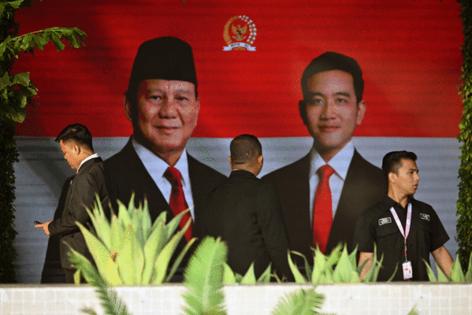Ex-General Prabowo to be sworn in as Indonesia's next president
Published in News & Features
Ex-General Prabowo Subianto will be sworn in as Indonesia’s president on Sunday, capping a 26-year rise that followed his dismissal from the military over alleged human rights abuses tied to protests that ousted his late former father-in-law and dictator, Suharto.
The 73-year-old is scheduled to take the oath of office at the parliament building in Jakarta around 10:30 a.m. before delivering an address to the nation of more than 280 million people. The ceremony marks a remarkable comeback for a man who once faced Western-imposed sanctions and had two failed election bids against the president he’s replacing, Joko Widodo.
A makeover on social media ahead of the February vote helped Prabowo reshape his image into a doting grandfather vowing to provide billions of dollars in free meals to students. He also pledged to maintain the business-friendly policies of the outgoing president, known as Jokowi.
But Prabowo’s most ambitious goals entail transforming the sprawling Southeast Asian nation into the world’s fastest-growing economy, setting an 8% annual growth target to hit in the next two to three years. Critics will also be watching to see if Indonesia faces democratic backsliding after Jokowi spent years strengthening the nation’s political elite.
“A Prabowo presidency promises a mix of nationalist fervor and pragmatic governance,” said Dedi Dinarto, an associate with advisory firm Global Counsel. “His leadership style is expected to be more authoritative than that of the outgoing President Jokowi, which may bring greater political stability. However, there are concerns that this could come at the cost of political freedoms.”
Prabowo takes office inheriting an economy that has grown at a steady rate of about 5% the past decade but has struggled to expand beyond that.
Boosting that figure will require addressing a dwindling manufacturing sector, declining jobs and a growing informal economy. The government will also have to ensure that its efforts at downstreaming — increasing the domestic processing of key natural resources like nickel — can extend to other commodities and attract more foreign direct investment.
As Jokowi’s defense minister, Prabowo modernized the country’s military, purchasing French-built Rafale fighter jets and securing additional submarines. He also prioritized strengthening defense partnerships with the U.S., France and South Korea.
To reach the presidency, Prabowo formed an alliance with Jokowi that included naming the outgoing president’s 37-year-old son, Gibran Rakabuming, as his running mate. Prabowo also vowed to continue building Jokowi’s landmark new national capital on the island of Borneo, a roughly $30 billion project that could prove an expensive distraction.
In exchange for his loyalty, Prabowo secured key backers in the powerful ruling class, including some current ministers who may retain their roles in his Cabinet. He appears to have consolidated majority support in parliament as part of a big-tent coalition championed by his predecessor.
“I have to have a big coalition,” Prabowo said at an investment summit this month. “It will be said, ‘huh, Prabowo’s Cabinet is a fat Cabinet.’”
Prabowo will announce his Cabinet picks following the inauguration.
To help pay for his $29 billion school lunch program and other new initiatives, Prabowo has promised to increase tax revenue to 14%-16% of GDP and cut back on wasteful spending.
After having served more than two decades in the military, some observers are concerned about what a president once banned from travel to the U.S. for human rights violations will mean for a nation that only returned to open elections in 1999.
Prabowo — who has long rejected accusations that he committed human rights abuses — assured Indonesians that his military background will have no bearing on his oversight of Southeast Asia’s biggest economy.
His administration is also likely to face scrutiny from democracy activists over the dominance of political dynasties in the country. Prabowo represents that thread of history not only through his running mate, but also as Suharto’s former son-in-law.
“If there is no opposition, then democracy becomes just a name,” said said D. Nicky Fahrizal, a researcher at the Jakarta-based Center for Strategic and International Studies. “The quality of democracy will decline, because everything will be controlled by the executive.”
©2024 Bloomberg L.P. Visit bloomberg.com. Distributed by Tribune Content Agency, LLC.







Comments